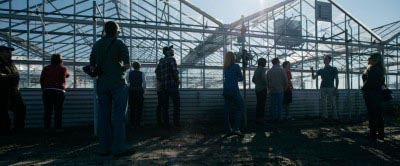
7 Surprising Reasons We Are Rebuilding a Regenerative Food System
November 21, 2014 by 4P Foods Founder Tom McDougall
On October 25th, we hosted a celebration of Food Day 2014. We brought together our team, our 4P Foods members, our friends, and many of our wonderful farmers. The weather was perfect, the food was delicious, and the conversation that flowed is exactly what we had hoped it would be: People coming together around food, and creating (if only for a moment) a sense of community among strangers. Food is magical in that way: it is a deeply human experience to break bread in the company of other people. It is bonding, it is joyous, and it is wonderful.
The day after our Harvest Festival, I got on a bus to New York City to attend the James Beard Award Food Conference. It was a two day conference that brought together academics, writers, foodies, chefs, and policy makers to discuss one of the biggest challenges we face as a society today: Our food system is broken – so what do we do about it?
I had the pleasure of meeting, listening to, and sharing conversation with some of my heroes: Michael Pollan, the author who changed my life when I read The Omnivore’s Dilemma. Marion Nestle, the professor, writer, and food activist who has devoted her life to these issues and continues to be a leader and inspiration. I listened to Mark Bittman, the NY Times columnist who continues to push and ask questions about how a more equitable food system should be designed. I admired Sam Kass, the Senior Policy Director at the White House who is also the Executive Director of the First Lady’s “Let’s Move!” campaign. I got choked up listening to Karen Washington, a community leader and activist who is using farmers markets and community gardens in low-income communities around New York to change the lives of people who all too often don’t have the help they need. The list goes on.
It was a concentration of some of the most intelligent and inspirational people I have ever met. Oh, and then there was me. My accolades don’t even come close to those I was surrounded by, which made me feel all the more lucky to have been invited in the first place.I mention the conference in the same breath as our Harvest Festival because I realized that what we are doing is, somehow, part of the solution. If we are to talk about solutions though, we must first accept the truth that there is a problem. And there is. Lots of them:
- Five of the eight lowest paying jobs in America are in the food industry
- One in three Americans will be diagnosed with type 2 diabetes. That number goes to 1 in 2 if you’re a person of color
- Small scale farmers are decreasing at a rate where, by 2025, we will be almost entirely reliant on the industrial food system for everything we eat
- Sugar has the same affects on our brain as cocaine, yet it is not labeled and is being used at a rate that is literally killing us
- The same companies that advertised and marketed on behalf of cigarette companies are now the same companies that advertise and market food to our children
- Less than 40 years ago there was 30,000 different items in an average grocery store. Today, that number is over 600,000.
- 75% of medical doctors receive 10 hours or less of training on nutrition in their schooling
… and the list continues: home economics classes have been cut from schools, junk food proliferates corner stores, Big Macs cost less than a head of lettuce, there are 56 different names for sugar on labels, misguided agricultural subsidies help to prop up harmful industrial agricultural companies while small farmers using sustainable practices are being put out of business, and on, and on, and on…
I used to say “our food system is broken.” After attending this conference, I now realize that that isn’t enough. The truth is, our system is broken. We can’t talk about fixing food if we don’t talk about food education in schools. We can’t talk about fixing food if we don’t talk about nutrition being integrated with health care and prevention. We can’t talk about fixing food if we don’t talk about raising wages so everyone can afford healthy food. We can’t talk about fixing food if we don’t talk about transportation infrastructure and access to healthy food. We can’t talk about fixing food if we don’t talk about energy policy and subsidies that deflate the true cost of industrial agriculture.
In the words of Mark Bittman, “If we are going to change food, we have to change everything.”When that sunk in on the first day of the conference, my heart sank. What a daunting task! How on earth can we change everything? Tuesday, however, was more uplifting. The conversation revolved around the fact that we, as individuals, can indeed change everything – when (and only when) our actions are taken together and used to build momentum, which builds a movement, which can revolutionize… well, everything.
Our Harvest Party on Food Day 2014 was a small snapshot into what a food system of tomorrow could look like. One where access to healthy food is considered an inalienable right as a human being. We are still a small company, making a tiny positive impact – but it’s an impact nonetheless. As we grow, and others like us grow, we have an opportunity to use food as a tool for social justice. That, to me, is incredibly exciting.I’ll close with the same closing words from the conference. They were introduced as the ten most important two-letter words you can ever share:
“If it is to be, it is up to us.”